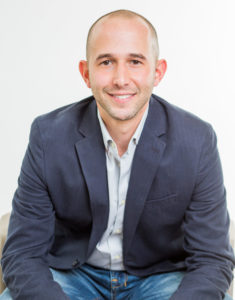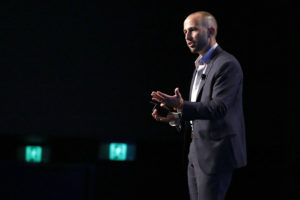 After a conversation with a taxi driver, Zach Mercurio decided to changed his entire career. Now, he’s dedicated his life to researching, teaching, speaking, learning, and consulting with others about the role of purpose and meaningfulness in work and life.
After a conversation with a taxi driver, Zach Mercurio decided to changed his entire career. Now, he’s dedicated his life to researching, teaching, speaking, learning, and consulting with others about the role of purpose and meaningfulness in work and life.
A fateful conversation
While working as an advertising account executive and making good money in Washington, D.C., Mercurio noticed that his employer and coworkers were obsessed with making money – and not much else. As a result, he noticed a collective sense of dread about Mondays and a workplace that was devoid of energy.
Then one day, while on his lunch break, a taxi cab driver struck up a conversation. The cab driver expressed to Mercurio how much he loved his work, not because he was a cab driver, but because he was able to talk with people from around the world.
Something clicked for Mercurio: We aren’t driven by what we do, he said. We are driven by why we do it and how we feel about it. In other words, we are compelled by purpose and meaning.
“We aren’t built to acquire and achieve things,” said Mercurio. “We’re built for purpose and meaning.”
Mercurio realized he was miserable in a money-driven, results-obsessed environment, and decided to leave his job so he could dedicate his time to helping others find their purpose. He moved to Colorado and started working at Colorado State University, coordinating new student orientations where he taught purpose-driven training workshops and began consulting and coaching on purpose and meaning with businesses and nonprofits outside the University.
This work led to Mercurio’s pursuit of a doctorate in organizational learning, performance and change through CSU’s School of Education. He also teaches courses on OLPC topics in the school’s student affairs in higher education master’s degree program. His work and research focuses primarily on shifting from a results-focused mindset to a purpose-centered mindset.
“One of the dominant beliefs about work and school is that, to be successful you must acquire and achieve,” said Mercurio. “We’ve been taught to be very results-focused.”
Exploring purpose and meaningfulness
Mercurio is trying to help others explore purpose and meaningfulness in their jobs, their personal lives, and their organizations by asking college students and business leaders around the country questions he was never asked. Specifically, his dissertation research will focus on CSU’s custodial staff, a population that has been historically understudied. His job as an orientation coordinator for new students allowed him to interact and converse with the custodial staff in Braiden Hall.
One woman who cleaned bathrooms and student’s living areas loved her job so much that she committed to knitting everyone in Braiden a winter hat. She was happy in her role as part of the custodial staff simply because she got to interact with students, something that she was very passionate about.
That struck Mercurio – that society’s necessary work done every day by people around the world for society to keep going is rarely applauded or deemed a successful career choice, but people do it, and some, like his friend, find significant meaning and purpose in it.
“I really think that, when we can understand what makes people experience their work as meaningful, it can be transformative for organizations and people’s experiences at work,” he said.
Mercurio is trying to channel that same mentality with the students he works with and businesses he consults for. This includes shifting business leaders’ mindsets to be less money-driven and more impact-driven. With college students, Mercurio says we must stop asking psychologically demotivating questions, such as “What do you want to do in your life?” and ask, “What is your life going to do for others?” instead.
Impact beyond the CSU campus

Last fall, Mercurio’s book The Invisible Leader was published. The book centers on the concept that the most powerful leader in our organizations or lives isn’t someone or money – it’s a common purpose. It took Mercurio three years to write The Invisible Leader; backed with research, it’s meant for everyone and guides readers through the process of leading a more purposeful life.
Additionally, Mercurio’s research is being recognized by the industry. At the 2018 Academy of Human Resource Development’s International Research Conference in the Americas, Mercurio and co-author Russell Korte, a former School of Education faculty member in the OLPC specialization, were honored with the 2017 Elwood F. Holton III Research Excellence Award. Through the award, the article “Pragmatism and Human Resource Development: Practical Foundations for Research, Theory and Practice” was named an outstanding refereed article in the journal Human Resource Development Review.
Outside of his research and teaching, Mercurio stays busy with cycling, mindfulness activities, blogging, and raising his five-month-old and three-year-old sons. He’s also planning to finish his dissertation this year.
“I’ve never known what’s next,” said Mercurio. “I joke that I’ve stumbled into everything that I’ve done in my life because I relinquished the idea of a life goal — because you can contribute whether you’ve lived on the planet for a year or a hundred years, so I want to spend my energy contributing to the world rather than trying to achieve a goal.”
The School of Education is part of CSU’s College of Health and Human Sciences.